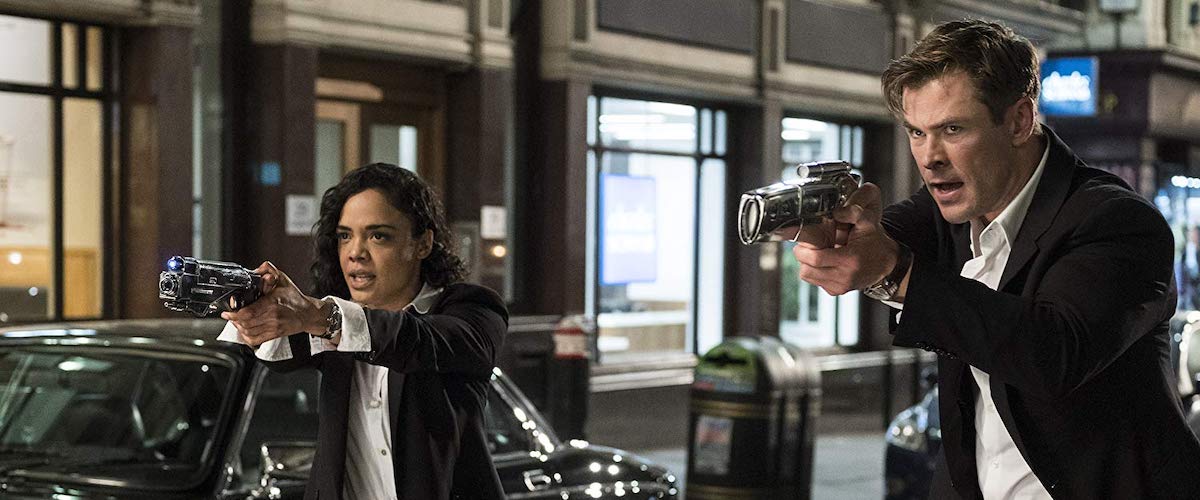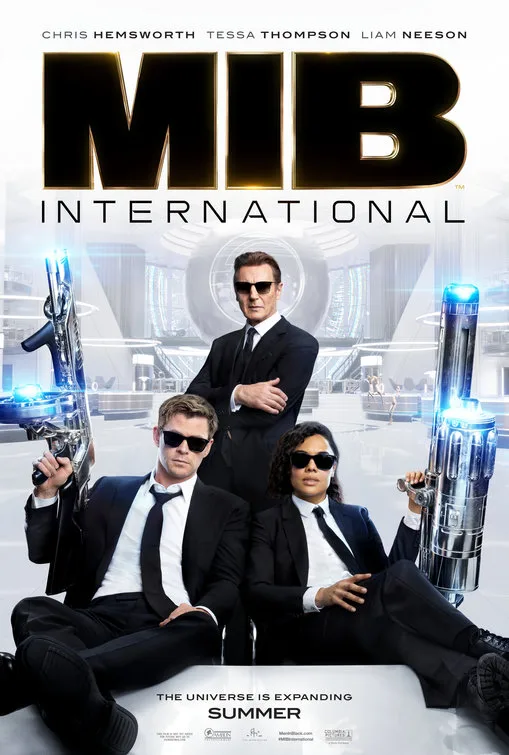Just because two stars are brilliantly paired together in one movie, it doesn’t guarantee their chemistry will carry over to another. The rapport between Tessa Thompson and Chris Hemsworth in Taika Waititi’s “Thor: Ragnarok” became one of the recent highlights of the Marvel movies—Thompson played a world-weary fallen warrior against Hemsworth’s clueless and sometimes emotional Norse god. Their dialogue comically dug at one another’s failings and wounded egos. Many fans wished to see these two actors trade witty barbs once again, but the pair’s new movie, “Men in Black: International,” strips away just about everything fun from the duo except their on-screen presence.
The latest “Men in Black” sequel no longer follows Agents Jay (Will Smith) and Kay (Tommy Lee Jones), although their likenesses are one of the many Easter eggs sprinkled throughout “MIB: International.” Instead, there’s a new hero, Agent H (Chris Hemsworth) and his mentor, High T (Liam Neeson), in the middle of a daring mission on the Eiffel Tower. Inexplicably, the story then jumps to Brooklyn 20 years prior, where a young Molly (Mandeiya Flory) first sees the Men in Black and encounters her first alien. She grows up (now played by Tessa Thompson) obsessed with space and joining the Men in Black. She gets a lucky break from Agent O (Emma Thompson) and sets off for her first mission.
I enjoyed my biggest laugh in the ‘90s Brooklyn sequence when Molly’s dad quotes Morris Day from “Purple Rain” while wearing a Prince shirt. Unfortunately, I still had over an hour and forty minutes left to go.
Part of what made the original “Men in Black” movies enjoyable was Will Smith and Tommy Lee Jones’ extraordinarily at-odds dynamic. Smith had an effusive reaction for every situation while Jones stuck an unmoving scowl on his face. For the new movie, Matt Holloway and Art Marcum’s script wastes this potential conflict by making the characters uninteresting. Agents H and M—which sounds like a reference to the clothing store—come across as co-workers who don’t really have much of a connection to each other outside of greeting each other in the morning and on their way out. There are hints of an attraction to each other, but that’s really misusing what made Thompson and Hemsworth so fun to watch before. Neither of the actors has Smith’s charisma to turn around bland dialogue and situations, so audiences are left with two famous faces and not much else to look at.
The script is easily the movie’s worst quality, as so many pieces fall into place out of convenience. Certain rules of this franchise, like not being seen with alien tech in public, are wholeheartedly ignored in scenes involving an alien motorcycle. Other plot points are so telegraphed they can hardly be considered a twist.
“Men in Black: International” is also the latest movie to shoehorn in a few empty pop feminist lines and call it progressive like when Agent M brings up why the organization’s name doesn’t include the Women in Black. Yet, not long after this scene, Agent M has to ask if she’s getting offered to an alien as a sexual companion. If this is Hollywood’s idea of feminism, I really wished they’d invest in women writers. The story didn’t need to go there, much like it didn’t need to add on excess exposition, other dull side characters and random country jumping to fulfill the need to see Westerners run through foreign marketplaces.
Throughout the MIB franchise, there have been a series of sometimes memorable but mostly annoying alien sidekicks. This movie’s unfortunate duty falls to Kumail Nanjiani, who to the best of his abilities, does land a few punchlines and earn a few laughs as a tiny “pawn”-like alien who pledges allegiance to a queen, Agent M. If even Nanjiani can’t make all of his jokes land, what chance do the two straight-faced leads have?
Director F. Gary Gray keeps the movie from entirely falling apart, but his efforts feel uninspired. Events happen and the agents move on, giving no time for emotions when there’s danger or death. Even for an action movie about aliens, it’s too heartless. The quality of CGI effects varies between impressive and wildly cheap. There’s a shot of the moon that looks like stock footage and a roughly rendered CGI shot in the chase sequence that appears as if they were cutting corners. The shape-shifting galaxy-patterned villains make for formidable and cool-looking opponents, but even much of their potential goes untapped.
Most of what’s enjoyable about this sequel have been cribbed from other movies, like the star pairing from “Thor: Ragnarok,” the villains’ similarity to the Twins in “The Matrix Reloaded” and the many references to the original “Men in Black,” including the score and the basic character arcs of a rookie learning the ropes from a top agent. Without its stars’ chemistry, there’s little life left on this sequel planet besides surface-level jokes, too-cute aliens and a convoluted story.




















